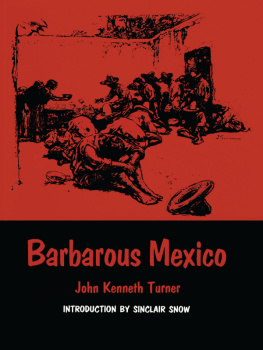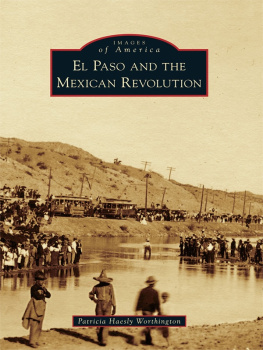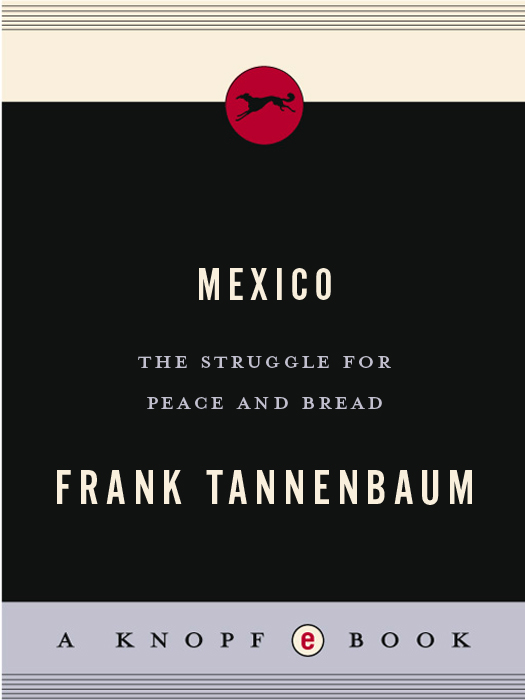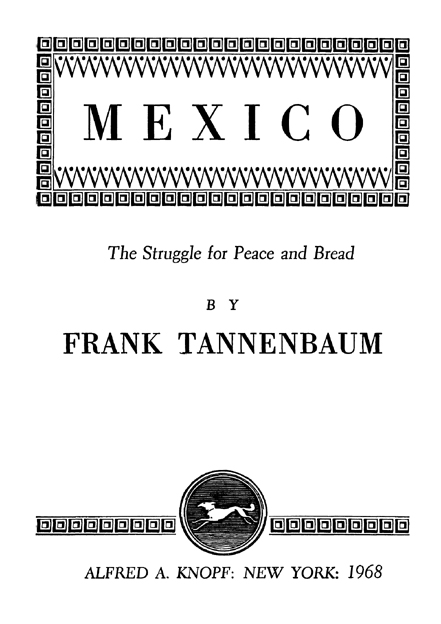BOOKS BY FRANK TANNENBAUM
TEN KEYS TO LATIN AMERICA (1962)
A PHILOSOPHY OF LABOR (1951)
MEXICO:
The Struggle for Peace and Bread (1950)
SLAVE AND CITIZEN:
The Negro in the Americas (1947)
THESE ARE Borzoi Books
PUBLISHED BY Alfred A. Knopf IN NEW YORK

Copyright 1950 by Frank Tannenbaum. All rights reserved under International and Pan-American Copyright Conventions. Published in the United States by Alfred A. Knopf, Inc., New York, and in Canada by Random House of Canada, Limited. Distributed by Random House, Inc., New York.
Published February 20, 1950
Reprinted six times
eISBN: 978-0-307-82648-0
v3.1
TO THE MEMORY OF
Moiss Senz and Miguel Othon de Mendizabal
WHO DEVOTED THEIR LIVES TO
THE MEXICAN PEOPLE
Introduction
T HIS BOOK was begun as a study of the issues at stake between Mexico and the United States since 1910; but the matters in dispute between the two governments cannot be understood apart from the Mexican social milieu. It therefore seemed necessary to describe the Mexican complex of economic and social tensions that gave the diplomatic dispute its peculiar flavor and significance. So that the disputes between the two countries, summarized in the last chapter, may be seen against the proper setting, this is a book about Mexico. The Revolution of 1910 merely added to the complexity of the Mexican scene and made it even more difficult for Americans to understand Mexicos inner stress and strain.
Looked at objectively, the discussion as it developed between the two countries was really beside the point and never came to grips with the issues. Under the circumstances, it could not do so. The Mexicans were concerned with preserving their freedom to work out the changes implicit in their Revolution, the United States with the defense of American rights adversely affected by the Mexican social upheaval.
The American argument persisted in restating the traditional position of the rights of foreigners contractually acquired under previous law. The Mexicans denied the very basis of the contract, not only for Americans, but even for Mexicans. In their view, the American thesis had no validity, being based upon a series of assumptions that they denied. This was especially true after the Constitution of 1917 came to rule Mexican political thinking. The Mexicans could not repudiate the program the Constitution sanctioned, and the United States could not accept it. Had the Americans really meant to assert the arguments they were elaborating in diplomatic notes, their only recourse would have been military intervention.
Two world wars, as well as two broad political changes in the United Statesthe New Freedom and the New Dealintervened in the discussion, and American foreign policy, proclaiming the doctrine of the self-determination of nations and upholding the policy of equal sovereignty within the community of American nations, found intervention impossible. The result was that Mexican governments had their way, and the United States receded in fact, even if not in theory.
In the end it became clear that the issues were broader than those involved between American private interests in Mexico and the Mexican governments. The Revolution really represented something that a large part of the American people believed in: the vindication of popular rights and the assertion of self-determination. We finally acceded to Mexicos program because in some way it really was also part of a developing American program in international affairs.
The two world wars served to strengthen the American belief that the rights of smaller nations must be defended, even if in the process the interests of American nationals are adversely affected. If we lost the diplomatic argument, we won the greater one, that of moral leadership in defense of the right of the little nation to a dignified place in the community of nations. Had we pursued our difference with Mexico to its logical conclusion of intervention, we would have wrecked the Pan-American system and would have had no moral grounds for our role during the Second World War. In fact, our experience with Mexico and the statement of international doctrines it evoked have served to fortify the influence of the United States in the contemporary world. In a strange and unexpected way the original statement that Mexico was free to work out its own policies, even if it injured the interests of United States nationals, and that the territorial integrity and political independence of Mexico were inviolate has, like bread cast upon the waters, returned a thousandfold. It has increased the moral and political role of the American people and given our government a place of trust and leadership in the world which it could not have achieved by a mere show of force. American foreign policy has been hammered out on the Mexican anvil.
Acknowledgments
T HERE REALLY IS NO WAY by which I can acknowledge my indebtedness to those from whom I gathered the substance of this book. It is a product of many years of interest in and contact with Mexico. I first went to Mexico in 1922, and over the years have been privileged to enjoy the friendship and kindness of many people. I owe a greater debt than I can repay to those friends wholike Ramn Beteta, Daniel Coso Villegas, Jess Silva Herzog, Manuel Gamio, and Gonzalo Robles, among many otherstolerated my inquisitiveness and my very American self-assurance. Perhaps, too, this is the place to acknowledge the kindness of the late Josephus Daniels and of Mr. Sumner Welles. The friendship of General Lzaro Crdenas stands apart and by itself.
Two Mexican friends, Silvio Zavala and Victor L. Urquide, helped me by reading sections of the manuscript. The former read Chapter iii, the latter Chapters xi, xii, and xiii. The manuscript was read and commented upon by Robert Warren and Winfield Riefler. Two of my colleagues, John H. Wuorinen and Dwight C. Miner, read the final chapter. Mrs. Bertha Singer and Mrs. Rhoda Metraux both read the manuscript in its earlier stages, and my secretary, Mrs. Dorothea Board-man, suffered through all its changes.
I want especially to acknowledge the editorial going-over that the manuscript received from Mr. Herbert Weinstock. Finally, if it is permissible for an author to say a kind word about his publisher, I should like to express my appreciation to Mr. Alfred A. Knopf for his interest in this volume.
F RANK T ANNENBAUM
Columbia University August 25, 1949
Contents
Chapter 13. The Conditions of Economic Progress: III
The people must learn that they can be governed without terror.
LZARO CRDENAS

The Configuration of the Land
M EXICO is an isolated country. Geographic obstacles have impeded communication and fostered a local, inward view and an aloofness from the outside that has proved not merely physical, but political and spiritual as well. Mexico is unlike any other country in the world, and almost every Mexican community enjoys its own quality of uniqueness. The physical geography could not have been better designed to isolate Mexico from the world and Mexicans from one another.












